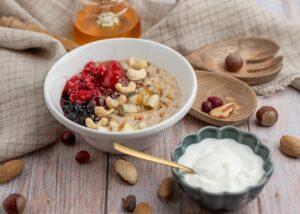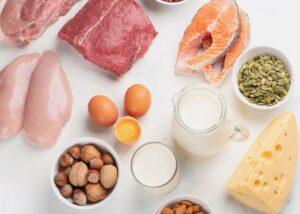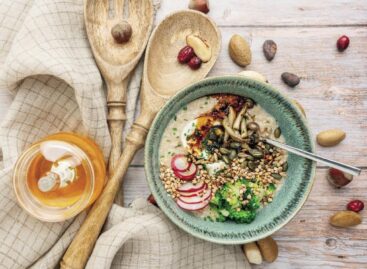These are the biggest misconceptions about protein consumption
Protein is one of our most important nutrients: not only is it the building block of muscles, but it is also the basis for the functioning of our hormones, enzymes and immune system. Yet there are many misconceptions about it, which can often mislead us in our everyday eating. A recent study on the subject was commissioned by Danone Hungary, and based on its findings, the company’s dietitian summarized the most common myths – and what the truth is behind them.
Miscellaneous myth 1: The more protein I eat, the more muscle I build
 Proper protein intake is indeed necessary for muscle growth, but it is not enough on its own. Strength training, adequate calorie intake and rest are at least as important. Moreover, there is a limit to the utilization of protein: above a certain amount, the excess will no longer build muscle.
Proper protein intake is indeed necessary for muscle growth, but it is not enough on its own. Strength training, adequate calorie intake and rest are at least as important. Moreover, there is a limit to the utilization of protein: above a certain amount, the excess will no longer build muscle.
Misconception 2: Plant proteins are less valuable than animal proteins
Many people think that only meat, eggs or dairy products are considered real sources of protein. However, lentils, chickpeas or even soy are also rich in protein. It is true that some plant proteins do not contain all the essential amino acids in optimal proportions, but with a varied diet and smart combinations (for example, consuming legumes and grains together), we can achieve a complete protein supply.
3. Myth: It only makes sense to eat protein within 30 minutes of a workout
The so-called “anabolic window” – the belief that protein intake is mandatory within half an hour after a workout – is more of a myth. According to research, it is much more important to have a full daily protein intake and distribute it evenly throughout the day, between breakfast, lunch and dinner. Of course, a protein-rich meal after a workout does not hurt, but you do not have to adhere to the half-hour time frame to the minute.
Myth 4: A protein-rich diet automatically makes you fat
 Protein itself does not make you fat – in fact, it helps maintain satiety and preserve muscle mass, so it can also support weight loss. Obesity is caused when total calorie intake exceeds our needs. If protein is included in the diet in the right proportion, it can be particularly beneficial for achieving ideal body weight.
Protein itself does not make you fat – in fact, it helps maintain satiety and preserve muscle mass, so it can also support weight loss. Obesity is caused when total calorie intake exceeds our needs. If protein is included in the diet in the right proportion, it can be particularly beneficial for achieving ideal body weight.
5th myth: The Hungarian diet already provides enough protein
According to Danone research, more than half (51%) of Hungarian adults are unsure whether they consume enough protein. Although meat and dairy products are often included in the diet, fish, legumes and oilseeds are much less common. In addition, only 4% of those surveyed know exactly how much protein they need per day. This shows that we often still have a false sense of security.
 6th myth: Protein powder, protein bars and products containing added protein are only for bodybuilders
6th myth: Protein powder, protein bars and products containing added protein are only for bodybuilders
Various protein powders and protein-rich products are not exclusively for athletes. These are convenient solutions that can come in handy if we do not have time for a full meal or if our protein needs have increased (for example, in old age or during recovery from illness). However, the basis should always be a varied, balanced diet.
+1 point: How much do we need?
The need is determined by several factors: the first and most important is body weight, and the calculation is most often done per kilogram of body weight. In addition, age – the extra needed to maintain muscle mass in older age; gender, activity – a sedentary lifestyle, regular exercise or intensive sports mean completely different needs; and the physiological state – e.g. pregnancy, breastfeeding, illness, post-surgery regeneration – affect the need.
General guidelines (grams/kilogram of body weight per day): 0.8–1.0 g for an “average” adult, 1.2–1.6 g for those leading an active lifestyle, 1.6–2.2 g for strength athletes, bodybuilders, 1.2–1.5 g for older adults (to prevent muscle loss). So for a 70 kg, moderately active adult, approx. 85–100 g of protein per day is the appropriate amount.
Related news
Dietitians recommend more conscious protein consumption
🎧 Hallgasd a cikket: Lejátszás Szünet Folytatás Leállítás Nyelv: Auto…
Read more >Protein intake: underrated plant sources in the Hungarian diet
🎧 Hallgasd a cikket: Lejátszás Szünet Folytatás Leállítás Nyelv: Auto…
Read more >Related news
GDP growth in OECD member countries slowed to 0.3 percent in the last quarter of last year
🎧 Hallgasd a cikket: Lejátszás Szünet Folytatás Leállítás Nyelv: Auto…
Read more >Change in Rossmann Hungary’s leadership: Kornél Németh decided to move towards new challenges in 2026
🎧 Hallgasd a cikket: Lejátszás Szünet Folytatás Leállítás Nyelv: Auto…
Read more >








